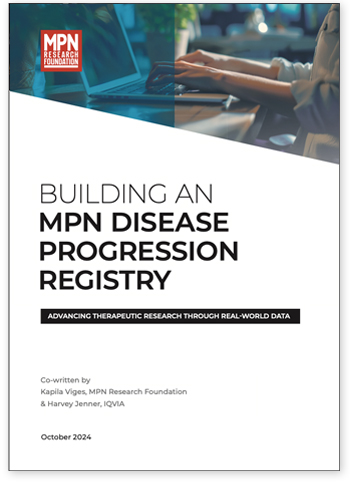Ned Weinshenker’s journey with myeloproliferative neoplasms (MPNs) began quietly—with a slow but steady drop in hemoglobin levels over a couple of years leading to mild anemia. At first, his doctor prescribed iron supplements to increase red blood cells. But in late 2018, when Ned began experiencing new and persistent night sweats, significantly enlarged spleen and intense itching in his legs, especially at bedtime, concern grew. His primary care physician referred him to a local hematologist — and the day after seeing the hematologist, a bone marrow biopsy was performed, confirming the diagnosis: primary myelofibrosis (pMF).
Seeking a second opinion, Ned secured an appointment at the Huntsman Cancer Institute, where an MPN specialist confirmed the diagnosis. The recommended course of action? Watch and wait.
Ned wasn’t comfortable with this.
“I didn’t like that prognosis,” he recalls. “I looked at the numbers. I figured I was either intermediate 1 or 2 MF— it was not a good idea to watch and wait at my age [76].”
So, he didn’t.
Ned dove into research — scouring journals, reading clinical data, and consulting the MPN Research Foundation’s resources. Among dozens of studies, one early-phase clinical trial caught his attention. Although only 4 patients had been reported on so far, the trial showed something rare: evidence of disease modification, not just symptom relief. In this trial, 2 patients went from transfusion-dependent to independent, and the other 2 experienced reductions in bone marrow fibrosis.
For Ned, that was enough.
He brought the trial to his Huntsman hematologist. The response was discouraging: “Sorry — we’re not a participating site and we do not currently have any pMF trials.”
That didn’t stop Ned. Leveraging his background in biotech and venture capital, he tracked down the company running the trial. In a stroke of luck, he discovered that one of its board members was an old graduate school classmate. With the help of this connection, Ned was soon speaking with the study coordinator and arranging an evaluation at the nearest trial site: UCLA.
“I told them, ‘I’m willing to go there,’” he said. “About a month later, I had my evaluation. I started the study in early March of 2019.”
Though he was hopeful, Ned didn’t expect a miracle overnight.
As someone deeply familiar with clinical trials, he understood how early-phase studies often moved slowly — and how long it could take for results to materialize. “I’ve seen the graphs from those early patients,” he explained. “I knew that it could take months, even a year or more, before any significant changes would show up. So, I was in it for the long term.”
The trial involved a dual-drug approach, and Ned knew one of the medications would likely cause his hemoglobin to drop before any improvements kicked in. Within weeks, he became transfusion-dependent — requiring red blood cell transfusions every 3-4 weeks for nearly a year.
Determined to see this through, he stayed the course.
“I wasn’t discouraged,” he said. “I understood what was happening. I expected it. And I had faith in the science.”
Gradually, his perseverance began to pay off. The transfusion intervals stretched — first to 6 weeks, then 9, 18, and finally 22 weeks until about 2 years into the study he became transfusion independent. Today, Ned hasn’t needed a transfusion in over 4 years. His blood counts, while not textbook-perfect, have stabilized enough to keep fatigue at bay. Even more encouraging, his spleen shrank by 2/3 in the first 12 weeks and is now in the normal size range.
Throughout his MPN journey, Ned documented his progress like an investigator; admitting this experience was somewhat of an “out-of-body” experience. “I’d look at the graphs of my data and think, ‘How is this patient doing?’” he said. “Then I’d remember — I am the patient.”
Ned built spreadsheets to log every data point: blood counts, spleen size, transfusion intervals, bone marrow biopsies, and even mutation allele frequencies. His ability to bridge scientific literacy with lived experience became a powerful tool — not just for himself, but for others.
Ned plays a key role in the MPN ecosystem. He serves on the MPN Research Foundation’s Patient Impact Council and sits on advisory boards for multiple pharmaceutical companies developing JAK inhibitors and other therapeutics. He also helps review clinical protocols for emerging therapies, offering a rare perspective that blends patient insight with research rigor. Recently he has assembled a group of Utah scientists to investigate an entirely new way to treat MPNs.
But perhaps most meaningfully, Ned connects with newly diagnosed patients — guiding them toward the right resources, encouraging them to ask questions, and sharing what he’s learned.
“Don’t be afraid to ask questions. In fact, when [patients] must sign informed consent forms, they should insist that their physician, their study coordinator, or even their nurse practitioner, who is heavily involved, take the time to go through the 25–75-page documents.” he said. “Don’t leave with unanswered questions.”
His Huntsman hematologist now refers other patients to Ned for peer support — knowing Ned’s knack at explaining complex treatment concepts in ways doctors sometimes can’t. “That’s always been one of my strengths,” he said. “Translating science into something lay people can actually understand.”
Ned’s journey underscores a powerful truth: MPN patients don’t just need treatments — they need information, advocacy, and connection. Ned’s experience and spirit, before and after his MPN diagnosis, provide the entire MPN community with a valuable ally.
From self-tracking spreadsheets to patient mentoring and clinical advisory work, Ned has become more than a patient advocate — he’s a strategist, a teacher, and a bridge-builder helping to transform how the MPN community navigates its future.
Ned’s journey from diagnosis to advocacy is a powerful reminder of what’s possible when patients become partners in their care. To hear Ned tell his story in his own words, watch his MPN Hero feature on YouTube: Watch Now
These represent first person accounts of real people living with Essential Thrombocythemia, Polycythemia Vera, and Myelofibrosis. It does not represent the views or opinions of anyone associated with MPN Research Foundation. Please consult your doctor before taking any action to manage your health.



